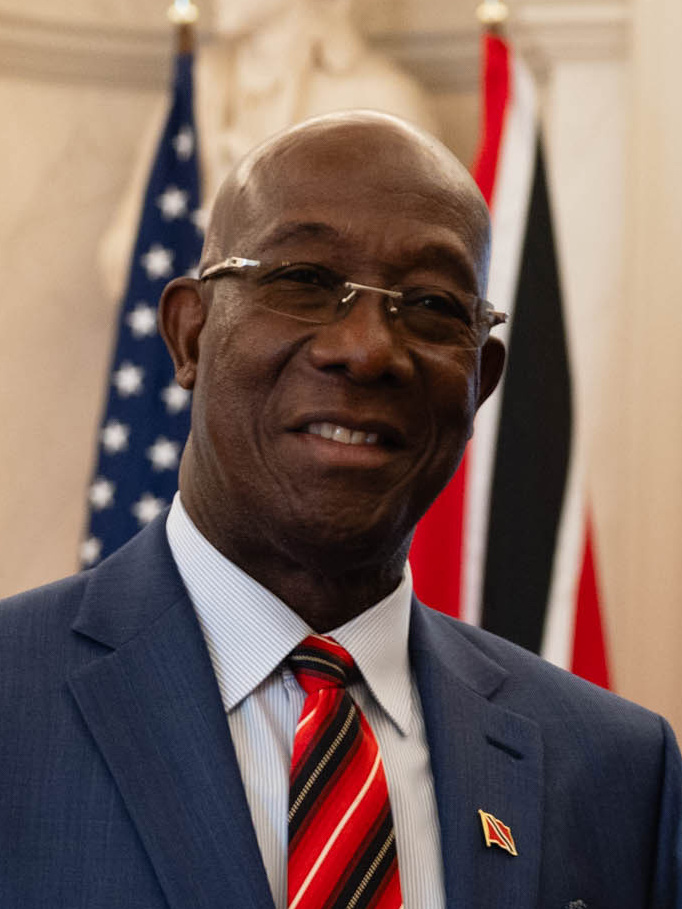In the past week, Prime Minister Keith Rowley of Trinidad was forced to show up at a post-cabinet press conference to quickly denounce a local newspaper report suggesting that the government had signed several bilateral agreements with the U.S., including one that would allow the U.S. to land or station troops in Trinidad in the event of an upheaval in the region or in neighboring Venezuela.
The Newsday report focused on one of five bilateral agreements the U.S. had signed with Trinidad through the Florida-based Southern Military Command after talks between the parties in the past week. Moving to quickly erase the diplomatic, political, and economic fallout that the report could have triggered, Rowley denounced it, saying that no one in the government was aware of anything that could have persuaded the island to sign such an agreement with Venezuela, with which it has strong friendly relations, even though he did not spell out the details of those agreements.
Rowley said the report had “serious implications for Trinidad. I am not discussing the agreement; I am simply saying that your interpretation of the agreement — that the United States can put troops in Trinidad and Tobago — is not what this is about. I’m simply saying that your interpretation is wrong. We don’t have a volatile relationship with Venezuela and we also have a very good relationship with the United States. We operate as an independent country, free to make our own foreign policy and treat with our associates as our national interests dictate.”
He concluded by asking, “What has changed to cause Trinidad and Tobago to be a platform for foreign troops on its territory in response to a Venezuelan situation?”
He said the status of forces agreements that were signed simply “allows our security agencies to have a relationship with the United States. That’s why we’re involved in it — of our security services.”
The brouhaha came at a time when Trinidad and its neighbor to the south are trying to kickstart a mega cross-border natural gas deal that would bring billions to their economies while navigating around existing American sanctions against Venezuela. Critics say this was a major motivation for the prime minister to set the record straight, even though he did not divulge the details of the military and other cooperation agreements to the nation.
The Venezuelan media outlet “Telesur,” meanwhile, also reported that neighboring Guyana had signed similar agreements with the U.S. — deals that “would confirm Washington’s intention to expand interventionism in the region to harm the revolutionary processes such as those in Venezuela, Cuba[,] and Nicaragua, and to control resources.”
“Telesur” also quoted from a U.S. embassy statement celebrating the agreements with the Florida-based Southern Command, spelling them out as status of forces agreements (SOFAs), the Caribbean Basin Security Initiative Technical Assistance Field Team (CBSI-TAFT), and the Acquisition and Cross-Servicing Agreement (ACSA).
American Ambassador Candace Bond noted that the agreements involving Trinidad and Tobago (TT) commit the U.S. to “providing expertise and resources to enhance TT’s security capabilities, and these agreements deepen strategic collaboration on a host of issues. TT’s leadership in implementing this framework for security cooperation demonstrates its potential as the cornerstone of peace and security in the Caribbean, and has opened the door to unprecedented and unequaled opportunities for defense cooperation between TT and the U.S.”
Despite Rowley’s denials, the paper said the deal allows U.S. troops to be deployed to the island during natural disasters and in the event of conflict in Venezuela because Trinidad is separated by just 7 miles of water via the Gulf of Paria.
“If I don’t come here today and as prime minister denounce this irresponsibility, if you were in Venezuela, what would you think? And if you are in Venezuela, where Trinidad and Tobago is negotiating with you all kinds of important matters but making its territory available for American incursions, in the event that it is determined that Venezuela has instability, what would you think?,” Rowley asked the media. “I cannot for the life of me understand who in Trinidad and Tobago would see it fit to publish a bold banner headline like that against the background of a picture of myself, Admiral [Alvin] Holsey, Minister [Fitzgerald] Hinds, and the U.S. Ambassador.
“I don’t want to call this mischief. I simply want to call it dangerous incompetence — to tell the world that we have entered into an arrangement, to tell Venezuela that we have entered into an arrangement, to tell Guyana and to tell Caricom that this big picture [on the front page] is representative of an action that we have taken with the head of SouthCom (Southern Command) Admiral Holsey, and it is about us creating an environment where the United States can place troops in Trinidad and Tobago to respond to instability in Venezuela. Whoever did this is not acting in the interest of the people of Trinidad and Tobago … I am so disturbed about this.”
Like this:
Like Loading…
Related
Source link : http://www.bing.com/news/apiclick.aspx?ref=FexRss&aid=&tid=6764671bc47241899597c58da11aa7a7&url=https%3A%2F%2Famsterdamnews.com%2Fnews%2F2024%2F12%2F19%2Ftrinidad-pm-govt-wont-allow-us-troops-to-be-based-there%2F&c=2245053137685017789&mkt=en-us
Author :
Publish date : 2024-12-19 04:49:00
Copyright for syndicated content belongs to the linked Source.
